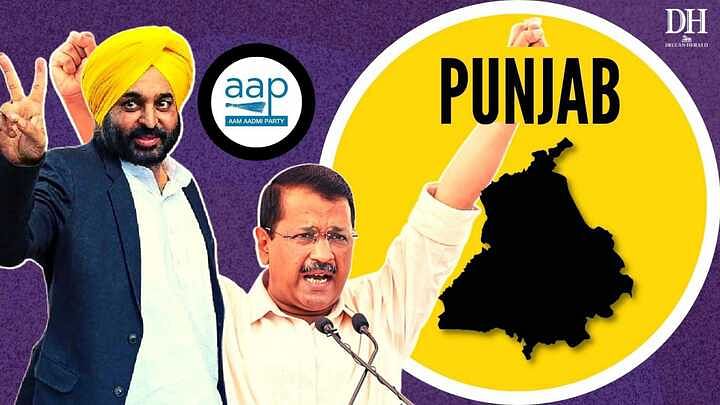
In the political sphere, a vacuum does not last for long. It helps a new force shoot up and, consequently, change the scenario altogether. In this round of Assembly polls, Punjab has proved this by presenting the Aam Aadmi Party (AAP) with a huge victory.
But, the implications of what has happened in Punjab may go far beyond the state. The reasons: the AAP is ambitious, it has the capability to grow in some other states, and the potential to be a 'party with a difference', which anchors itself in a centrist position in the Hindutva versus secular debate, and being born out of Anna Hazare's anti-corruption crusade, works for purifying Indian politics.
It also works for the AAP that it, within its ranks, does not have 'traditional 'politicians' who repel bright, young and honest women and men from joining politics. But, after being welcomed by the people of Delhi, Arvind Kejriwal veered towards the hardcore secular liberal camp that the people are rejecting except in a few states. However, the AAP was not born to be hand in glove with other parties that face corruption charges.
But then Kejriwal started correcting the course. The AAP is still secular, but no more part of the 'appeasement politics' practised by the Congress, Trinamool Congress, Left or even the Nationalist Congress Party (NCP). Slowly, it is establishing itself as a centrist party that is neither part of the staunch Hindutva force (exemplified by Yogi Adityanath in UP) nor the radical secular forces.
It is not that the AAP has already evolved to attain the highest standard of being a modern, progressive party. But the way it swept Punjab, particularly the Malwa region, is a pointer to the fact that it has become equally acceptable across religious identities, unlike the Bharatiya Janata Party (BJP) (dependent solely on Hindu votes), or parties like the TMC or SP (dependent heavily on Muslim votes). It makes the AAP different.
The AAP has achieved this feat by accepting that India is, essentially, both demographically and culturally, a Hindu country, and the sentiments of Hindus need to be honoured.
An example of this realisation was Kejriwal's tweet on December 3, 2021, that read: "A few days ago, when I had visited Shri Ramlala in Ayodhya, a thought came to my mind that I should bring all my elders of Delhi for a darshan of Lord Shri Ram. The first train of pilgrimage was flagged off from Delhi to Ayodhya today. These were very emotional moments for me. May everyone's journey be blessed. Long live Rama."
At the same time, the AAP has not shown any sign of not extending the concept of rajdharma to all the minorities of India. Neither has it shied in politically opposing the BJP on secular issues, like farm legislation.
Again, from the reactions of the AAP leaders after the remarkable victory in Punjab, it appears that the AAP has finally given up its confrontationist attitude towards the Centre. Such attitude, followed by leaders like Mamata Banerjee, may garner votes but harm their states. Odisha Chief Minister Naveen Patnaik has proved that it is possible to defeat, at the state level, the ruling party at the Centre handsomely and time and again, even after cooperating with the Centre and deriving benefits for his state.
Thus, the AAP has reshaped its political direction in a way that may become more satisfactory and acceptable to a large section of Indian voters who do not like the extremity, or some other follies, like corruption or other moral turpitude, of either the BJP or the hardcore seculars like the Congress, SP or TMC. But at the same time, it may make the AAP 'untouchable' to both the opposing camps. The first welcome sign is that the AAP leaders are aware of it and did not join either of the camps in Goa, where they have won 2 seats in an assembly of 40 seats.
The AAP now has to its credit of being the only non-BJP, non-Congress party that rules more than one state. To make it a real turning point, Kejriwal needs to concentrate on making the party strong in states like Gujarat, Maharashtra, Goa, Uttarakhand as on reviving the party's original agenda in its entirety. It means the AAP leadership must recollect that the party was born out of an 'idea', the crux of which was the anti-corruption crusade.
The central government of the day may not be plagued by corruption charges like that of Manmohan Singh's, but corruption has not gone down significantly. Prime Minister Narendra Modi's demonetisation helped the rich launder their unaccounted money. Indian political scenario is still plagued by corruption. The AAP must start a dharmayuddha for purification of politics.
If it can do so, it will come up, in the long term, as a genuine third force to which people may prefer. Otherwise, the vacuum will be filled by some other party that may emerge out of the blue.
(The writer is a journalist and author based in Kolkata.)
Disclaimer: The views expressed above are the author's own. They do not necessarily reflect the views of DH.
Check out the latest videos from DH: